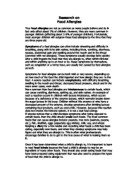The difficulty comes when the body perceives as harmful foreign proteins that are actually harmless, as is the case with nut protein. In these cases the body’s reaction is in itself more harmful than the allergen.
Allergic reactions occur in people who have been sensitised - in other words they have come into contact with the allergen before and their immune system has already produced antibodies designed to destroy the foreign protein. When further exposure occurs, these antibodies are produced in greater quantities. The antibody that triggers allergy is generally called Immunoglobulin E (IgE). The IgE antibodies attach themselves to special cells called mast cells, which can be found in the skin, lungs, upper respiratory tract and in the lining of the stomach. Contact with the allergen leads to an excessive reaction from the immune system whereby the mast cells suddenly release powerful chemicals including histamine. The chemicals are released in order to destroy the foreign protein or allergen.
The release of the chemical histamine has a number of effects on the body, which we term the allergic reaction. Allergic reactions tend to occur in the parts of the body at which the immune system is activated. Food allergy – where the protein is ingested, can cause both local problems (swelling or itching of the lips tongue and throat) as well as sometimes causing nausea, vomiting, diarrhoea and stomach pains when swallowed.
The body absorbs food from the bowel, which then enters into the bloodstream and can then permeate all parts of the body, so that some people also suffer a range of reactions such as skin rashes, joint pain, headaches, palpitations and rhinitus. In its most extreme form the body can go into shock – anaphylaxis - an allergic response that can prove fatal unless immediate medical attention is received.
Attention-deficit hyperactivity disorder (ADHD)
Attention-deficit hyperactivity disorder (ADHD) is the name of a group of behaviours found in many children and adults. People with ADHD have a pattern of inattention (lack of attention) or hyperactivity (too much activity) that is worse and more frequent than what is considered usual for their age. A child who is both inattentive and hyperactive will have 6 of the 9 symptoms from both of these lists. It is a common disorder that affects 3 to 5 percent of school-age children, and it is more common in boys than in girls. The child with ADHD who is inattentive will have 6 or more of the following symptoms:
- Has difficulty following instructions
- Has difficulty keeping attention on work or play activities at school.
- Loses things needed for activities at school and at home
- Appears not to listen
- Doesn't pay close attention to details
- Seems disorganized
- Has trouble with tasks that require planning ahead
- Forgets things
- Is easily distracted
People used to think that ADHD was the result of some type of brain damage. We now know that the brain structure of children with ADHD is normal, but the chemistry in the brain isn't normal. Children with ADHD do not make enough chemicals in key areas in the brain that are responsible for organizing thought. Without enough of these chemicals, the organizing centers of the brain don't work well. This causes the symptoms in children with ADHD. Bad parenting doesn’t cause ADHD, but a disorganized home life and school environment can make the symptoms worse. ADHD isn't caused by a diet that contains too much sugar, too little sugar or aspartame (brand name: Nutrasweet). Food additives, food colourings, food allergies or other allergies, or a lack of vitamins doesn’t cause it. Too much TV, fluorescent lights or video games also don’t cause it.







